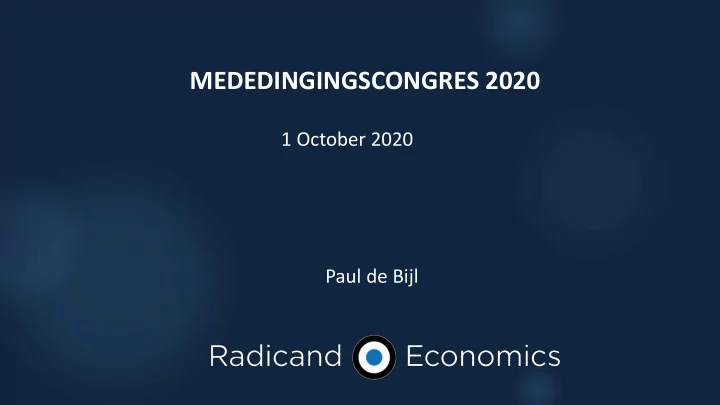

MEDEDINGINGSCONGRES 2020 1 October 2020 Paul de Bijl
Attitudes and drivers towards (control of) big tech Part 1: General perspectives
ACM's Middle Way • Neo-structuralism: "ex-ante intervention mechanism to prevent anti- competitive behaviour by dominant companies acting as gatekeeper" (Benelux memorandum 2019) • Consumer welfarism: ACM has always had a keen eye for factual evaluation of consumer welfare impacts • Mission statement: Markten goed laten werken voor mensen en bedrijven
Key point in Nicolas Petit's book: foster the discovery process • It's risky to leave it up to powerful, established market players... • ... but beware of CA trying to implement a market blueprint • Digital markets: state of flux, wandering market boundaries, innovative business models, disruption of value chains Cue to NRAs: make sure that newcomers (entrants, suppliers, customers, whatever!) can challenge existing value chains through intermediation and disintermediation
Fostering dynamic and unpredictable market processes is hard for CAs • Case in point: impact assessments (of short-term impact on consumer welfare)... • ... leave out longer-term effects on investments, innovation, entry mode decisions (choice of business model), market disruptions Challenge: Can CA exert and evaluate effort to keep/make markets susceptible to disruption by newcomers like unexpected entrants with innovative, unforeseen business models?
Attitudes and drivers towards (control of) big tech Part 2: Apple versus Epic Games (video intro)
Epic Games' complaints 1. Apple monopolizes market for iOS app distribution, preventing Epic from introducing its own iOS app store 2. Apple monopolizes market for iOS in-app payment processing, preventing Epic from doing direct business with gamers The Platform Law Blog, "Epic Games files lawsuits against Apple and Google", 17 Aug. 2020
How to interpret this? DIGITAL GATEKEEPERS: Assessing exclusionary conduct study commissioned by Ministry of Econ Affairs and Climate Policy with Nicolai van Gorp (e-Conomics) Insight into • nature of competition in digital markets • factors that determine when platforms have gatekeeper position • effectiveness of ex ante versus ex post interventions https://www.government.nl/documents/reports/2019/10/07/digital-gatekeepers
Startin ing poin int of the study comes from management lit literature "locus of competition expands from rivalries among similar firms... ...to include asymmetric competitors and firm's own suppliers and intermediaries" Rogers (2016)
Competition in in dig igit ital l markets = dynamic rivalry to control and challenge access to crucial nodes in value chain (access to data, content, users, etc.) • intermediation of value chains • disintermediation of value chains
Digital competition perspective • Apple is trying to maintain control over relationship with end-users • Apart from efficiency reasons, Apple may fear that downstream developers turn into upstream rivals • Indeed, allowing Spotify or Epic to take over commercial dealings with end-users puts Apple on the back burner App Store restrictions reduce risk of intermediation and disintermediation
Tradeoff 1. Efficiency motives: quality and security of apps 2. Defensive motives: hinder competitive strategies of firms like Epic and Spotify 3. (Pro-competitive motives: challenge dominant player in adjacent market)
Impression • While there are good efficiency reasons for restrictive policies... • ... these reasons may fall short of justifying Apple's App Store policies
A vertically integrated platform discriminates… if it has efficiency reasons for doing so: • quality, relevance of interactions, security if it is dominant and has pro-competitive reasons for doing so: • challenge dominant player in adjacent market (moligopoly) if it is dominant and has defensive (anti-competitive) reasons for doing so: • anticipating countervailing buying power • preventing multi-homing • leveraging downstream network effects into upstream platform • pre-empt (dis)intermediation by rivals • ensuring (or blocking) exclusive data access
Recommend
More recommend